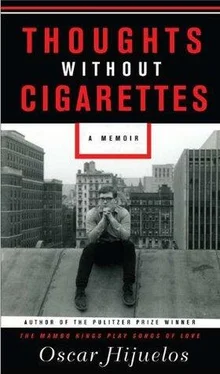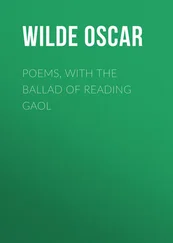Once I had put a couple hundred pages together, a lot of them with cigarette ash burns, wine and juice and who knows what else stains, I was almost tempted, because of my usual self-doubts, to rearrange everything again, but in some moment of practicality, I decided to say to hell with it and, catching a subway downtown, dropped the manuscript off at my agent’s office.

Then I tried to forget about the whole thing: It was not as if, after all, I lived in a writers’ world or had a lot of colleagues to mull things over with. In fact, I’d be fabricating a lie to say that I expected anything to come about from that vocation, and if I had any hope for that manuscript, it came down to a simple desire to pay off my bills. Approaching my late thirties, and having turned my back on an advertising career — to think I could have run a Seattle office or worked at Y&R writing copy like “You can taste it with your eyes!” —I really didn’t have any other prospects in my life, except for that book. What else could I do but hope that someone would be interested enough in it to offer me an advance?
However, it wasn’t only about that: I seem to recall having a sense that writing books was a noble pursuit, akin to bringing some light into the world, and while I can’t begin to put myself in that idealistic place again, I’ll only say that, back then, it was my naïve faith in the value of literature that also kept me going. At the same time, I couldn’t begin to imagine an interest in my work. Who, after all, published Latinos? And what were they going to do with a name like Hijuelos, and who the fuck could care one bit about a lowly spic superintendent’s life and a bicultural world that, with links to the one I had been raised in, no one had ever written about, except me in that first book, Our House , which, to this day, has mainly remained forgotten? Of course, I wondered what sophisticated readers would make of the fact that my main character, Cesar Castillo, father of that universe, drank too much because of the woes of his life (Yes, of course, a cliché, I could imagine people thinking), or of the fragile Nestor Castillo, whose obsessions with a woman (and country) left behind, as well as his memories of nearly dying as a child, closely paralleled my own. Would those two seem pathetic? Or too emotionally blunt for any readers?

Thankfully, I could depend on my family — or my mother specifically — to help me forget about that little corner in my life. In fact, when I’d head over to 118th Street to visit her, she, having her list of required gifts — some food, a dessert of some kind (chocolate ice cream), and a bottle of wine (for she had developed a taste for it in later years) — would speak with admiration about how my older brother had everything together — kid, wife, house, reliable union job — while, at the same time, she’d imply without exactly saying it that I’d turned out to be a trastornado, or screwed-up loser. Indeed, I really had nothing going for me except some vague creative aspirations, which in that neighborhood, where most of the kids grew up to become cops and firemen and union workers (or else junkies, con men, and criminals), meant becoming a bum, or as I’d often hear, a “hangout artist.” On some level, she must have felt sorry to see her son floundering, and though I think it finally hit her that I might have been bright, I’m sure she didn’t think I had much to show for my efforts, except some fleeting worldly experiences. And I think she secretly suspected that I was broke, for a few times when I brought over Chinese food, my mother offered to pay for it — something which, for a woman who watched her every penny, was a remarkable gesture of generosity (or pity).
On the other hand, she could really rub the vanity of my situation in my face. Oh, she’d tell me about every son and daughter of a friend to have landed a good job, how many kids they had, where they lived, or conversely, perhaps in an attempt to make me feel better, go into some of the local tragedies — that my old friend Bobby Hannon went crazy; or that Philip Ricart, Belen’s son, who, once dapper and supremely well composed, took too much LSD and became a street person; and so on with one sorry story after the other, like the fire that had, the past winter, swept through a hotel in Quebec, in which one of the beautiful Haitian sisters from upstairs and her daughter, vacationing there, had perished, or that she’d just run into Mr. MacElvoy, whose sixteen-year-old son, on the brink of becoming a seminarian, had been murdered one Christmas some years back — and how shattered he remained over that — or that one of the priests at Corpus was a repressed homosexual, and that Frankie, from the pharmacy on 120th Street, still lived with his mother and drank too much. . in her way, rightly reminding me that much worse could happen to a person than being out of work.
Sometimes, too, she’d spook me, staring at me strangely — especially if I’d made the mistake of lighting a cigarette: “So you’ve forgotten how you almost died, huh?” she’d say. “Go ahead, kill yourself.” Then she might lecture me about health food and vitamins—“When was the last time you went to a doctor?”—before going off into a momentary spell, fixated on my eyes, and coming out of it, she would say: “ Sabes cuánto te pareces a tu papá? ”—“Don’t you know how much you look like your father?” The kicker is that while growing up, I’d always wondered why, if I looked so much like my father, who in my eyes was muy muy cubano, no one ever took me as a Cuban.
One day, while pondering that long-standing mystery, I asked her, “If Pop was so Cuban and I look just like him, how come nobody ever takes me as so?” Laughing, she answered: “ Tu papá ? Why, he never looked Cuban at all!”
Seeing her was always wonderful and awful at the same time. Feeling both inspired and drained by my mother, once I’d finally get home to my apartment, the first thing I’d do was pour myself a hearty drink (usually wine, my other favorite, vodka, being a luxury) and light a cigarette — and if the right frame of mind hit me, I’d feel a momentary bliss and almost an optimism about my future as a writer. But just as often, depleted and my spirits low, I couldn’t even begin to muster the strength and will to imagine the things that would, shockingly, happen with that novel.
By the time my agent started sending the novel around, we’d decided, during the course of a telephone conversation, to change its title to the far more swinging and cheery The Mambo Kings Play Songs of Love , which, if you know that book at all, was the name of a 33 LP album Cesar Castillo and his brother, Nestor, had recorded back in 1955 or so. There were several literary houses that my agent had considered sending it to, among them Farrar, Straus & Giroux, but she’d already been trying to interest one of their more upcoming young editors in my work, an Exeter/Ivy League sort with poetic credentials, Jonathan Galassi, who I had met briefly in her office, years before while working at TDI. Thin, intensely bookish in his looks, he dressed in the manner that one supposed certain editors did: button-down shirt, jacket and bow tie, loafers, and, I recall, wire-rim glasses. His handshake was neither here nor there, though his manner was never less than affable, if, however, a little too patrician for my taste — but then, in those days, most editors were. At the time, I hadn’t realized how lucky I was to be introduced to such an important fellow, that as a Latino, I was being afforded the unique opportunity to break through such a long-standing literary barrier into a world that, worshipping the likes of F. Scott Fitzgerald and John Cheever, had yet to give Latino writers a chance at all.
Читать дальше














